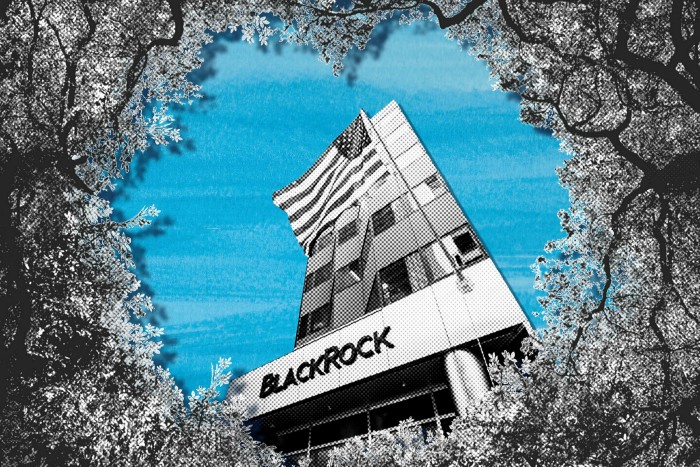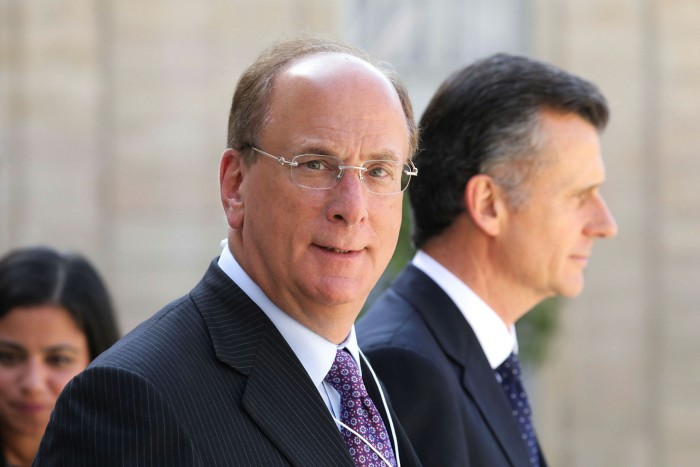BlackRock funds ride high on ethical investment inflows

Simply sign up to the ESG investing myFT Digest -- delivered directly to your inbox.
By building a dominant suite of exchange traded funds, BlackRock has also developed a marketplace for people eager to align their beliefs with environmental and socially-conscious investments.
Competitors are now springing up, such as the start-up investment fund Engine No. 1. Nevertheless, BlackRock, under chief executive Larry Fink, remains by far the largest player in ETFs that have environmental, social and governance (ESG) characteristics — via its iShares range.
Independent investment research group CFRA calculates that almost 60 per cent of all assets in ESG ETFs are held through BlackRock — and 64 per cent of new net fund flows into such funds in the past year have gone to BlackRock.
As a result, BlackRock manages seven of the 10 largest ethically-themed ETFs in the US and the three largest such funds in Europe, according to data provider Morningstar.
“In the ESG space specifically, BlackRock has been very dominant,” says Aniket Ullal, head of ETF data and analytics at CFRA.
Although Europe has led the development of ESG products, Americans have more money invested specifically in ESG ETFs. BlackRock’s ESG Aware MSCI USA ETF, alone, has $24bn of assets under management, Morningstar reports. That is more than double the largest equivalent ESG fund domiciled in Europe, which is also an iShares MSCI USA ETF.

This growth in the ESG ETF market in the US has largely been driven by young, millennial investors who manage their own accounts.
US law discourages employers from putting ESG funds into 401(k) retirement plans. But, while asset managers push the Biden administration to change this law, demand for ESG ETFs is being “driven by younger investors, specifically those with self-directed accounts”, Ullal says. “They want their investments to reflect certain values.”
Still, people looking to ESG funds for exposure to businesses that reflect their values will find their holdings dominated by the same few big companies. Microsoft is the most widely held stock in US ESG funds, according to Bank of America, and is often the top holding in the largest such vehicles. Apple and Alphabet are often the other two technology titans jockeying for the top position in such exchange traded vehicles, according to an analysis of the largest fund holdings in the US and Europe.
Similarly, ESG funds will typically exclude the same types of company: those that make civilian firearms, controversial weapons or tobacco, as well as businesses involved in coal or oil sands.
BlackRock has been able to win inflows for its sustainable investing products mainly because their charges are low — in most cases, comparable to the cost of holding conventional, non-ESG, ETFs.
However, there are competitors offering themed funds that will do more than passively track an ESG index.
Engine No. 1, the investment fund that won three board seats at energy group ExxonMobil in 2021, launched its inaugural ETF last June and now has $288mn of assets under management. Rather than excluding certain companies or rebalancing stocks, its ETF challenges companies by voting at their annual general meetings. It seeks to “hold companies and leadership teams accountable”. The ETF promises to work actively with companies to drive performance.
Engine No. 1’s second ETF, which began trading earlier this year, invests in companies that are on target to have net zero carbon emissions. And it is a type of mandate that has become increasingly popular, observes Rumi Mahmood, a vice-president for ESG and climate fund research at MSCI, the index supplier.
“One emerging area of growth particularly, in Europe, is funds that are aligned to explicit temperature targets,” he says. Paris-aligned ETFs, for example, will track indices in which constituent companies “are on a trajectory toward a 1.5 degree target [of capping man-made climate change],” he explains.
But the new Engine No. 1 ETFs are notable in that they are actively managed. These ETFs do not merely track an index but are mandated to follow an active management process, while still publishing their holdings each day. Now, the enthusiasm for actively-managed ETFs is coming together with the enthusiasm for all things ESG, says Ullal.
ESG funds’ popularity has also grown as their fees have dropped in recent years. For large asset managers such as BlackRock, the fees charged for ESG ETFs have become comparable to those for conventional equivalents. The management fee for BlackRock’s largest ESG ETF is 15 basis points. “We will continue to see fee compression,” Mahmood predicts.
One of the big questions for ETF providers going forward is whether ESG funds will become core holdings for investors, Ullal says. “Will they stop holding the S&P 500 ETF and instead hold the ESG ETF equivalent?” he asks.
“If they want core US equity exposure, will they [also] insist on an ESG screen? If that happens, I think that will be a significant shift in the US market.”

Comments